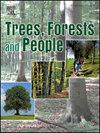Reconciling different interests in the Hutan Harapan rainforest ecosystem restoration management in Sumatra, Indonesia
IF 2.7
Q1 FORESTRY
引用次数: 0
Abstract
The Hutan Harapan is the last remaining lowland tropical rainforest in Sumatra, with an area of ca. 100,000 ha (hectares). It was granted by the Ministry of Forestry to a private company (PT REKI) with an Ecosystem Restoration Concession (ERC) license to carry out forest restoration. ERC is a new market-oriented policy option in Indonesia that promotes private investment in restoring and managing production forests to reverse deforestation and contribute to ambitious global restoration targets. Despite being a logged-over area, Hutan Harapan is still rich in biodiversity, home to the Batin Sembilan indigenous people and the Malay tribe, as well as many migrants. However, Hutan Harapan has become a forest island surrounded by oil palm plantations, monoculture industrial timber estates, and agricultural lands. As a result, Hutan Harapan has become highly accessible and exposed to threats such as encroachment, illegal logging, poaching, and forest fires. This study presents lessons from PT REKI's experience in the forest in addressing complex issues and threats with different management approaches. Stakeholder analysis, participation and social capital theory, and ladder participation theory are used to analyze the forest management approach taken by PT REKI. This company has implemented stakeholder engagement strategies in its operations, used social capital in conflict resolution and law enforcement, conducted tiered participation, and promoted multipurpose forest management to address threats, deforestation, encroachment, forest fires, and other illegal activities. Using these approaches, PT REKI has delivered a remarkably positive outcome, as evidenced by declining rates of deforestation and illegal activities, effective conflict resolution, prevention of forest and land fires, and garnering support from surrounding concessionaires and other stakeholders. It has resulted in land use stabilization, reduced social costs, a positive corporate image, and broader stakeholder support, instilling hope for the future of forest management. PT REKI, however, still faces many challenges due to heightened social pressures, wildlife poaching, and land clearing for oil palm development.
调和印尼苏门答腊岛Hutan Harapan雨林生态系统恢复管理中的不同利益
Hutan Harapan是苏门答腊岛仅存的低地热带雨林,面积约为10万公顷。林业部授予一家私营公司(PT REKI)生态系统恢复特许权(ERC)许可证,以进行森林恢复。ERC是印度尼西亚一项新的以市场为导向的政策选择,它促进私人投资于恢复和管理生产性森林,以扭转森林砍伐的趋势,并有助于实现雄心勃勃的全球恢复目标。尽管是一个被砍伐的地区,Hutan Harapan仍然拥有丰富的生物多样性,是Batin Sembilan原住民和马来部落以及许多移民的家园。然而,Hutan Harapan已经变成了一个被油棕种植园、单一栽培工业木材庄园和农业用地包围的森林岛。因此,希望之邦变得非常容易进入,并面临着诸如侵占、非法采伐、偷猎和森林火灾等威胁。本研究介绍了PT REKI在森林中以不同的管理方法解决复杂问题和威胁的经验教训。运用利益相关者分析、参与与社会资本理论、阶梯参与理论分析PT REKI的森林经营方式。该公司在其运营中实施利益相关者参与战略,在解决冲突和执法中使用社会资本,分层参与,并促进多用途森林管理,以解决威胁,毁林,侵占,森林火灾和其他非法活动。通过使用这些方法,PT REKI取得了显著的积极成果,证明了森林砍伐和非法活动的下降,有效解决了冲突,预防了森林和土地火灾,并获得了周边特许经营者和其他利益相关者的支持。它稳定了土地利用,降低了社会成本,树立了积极的企业形象,获得了更广泛的利益相关者的支持,为森林管理的未来注入了希望。然而,由于社会压力加剧、野生动物偷猎和油棕开发的土地清理,PT REKI仍然面临许多挑战。
本文章由计算机程序翻译,如有差异,请以英文原文为准。
求助全文
约1分钟内获得全文
求助全文
来源期刊

Trees, Forests and People
Economics, Econometrics and Finance-Economics, Econometrics and Finance (miscellaneous)
CiteScore
4.30
自引率
7.40%
发文量
172
审稿时长
56 days
 求助内容:
求助内容: 应助结果提醒方式:
应助结果提醒方式:


